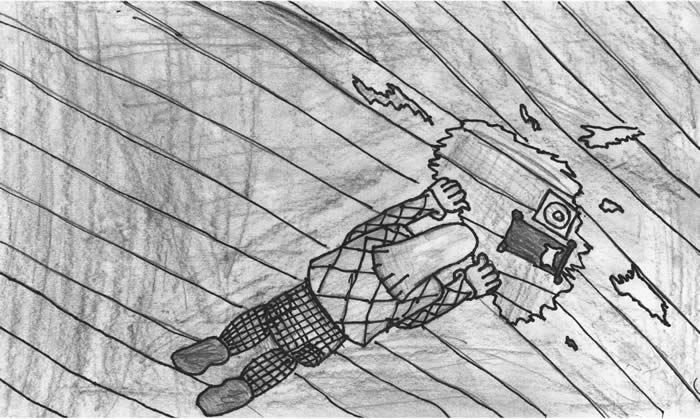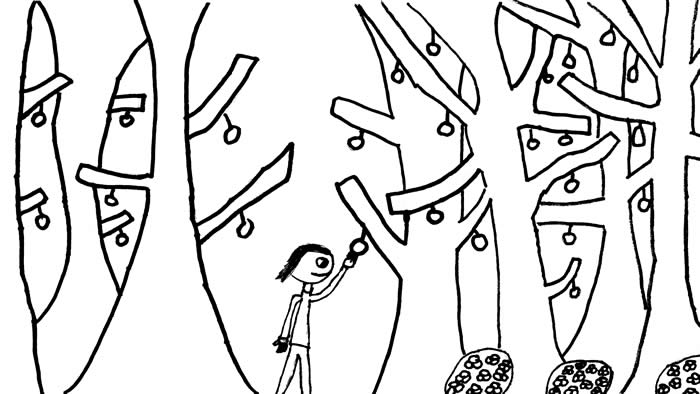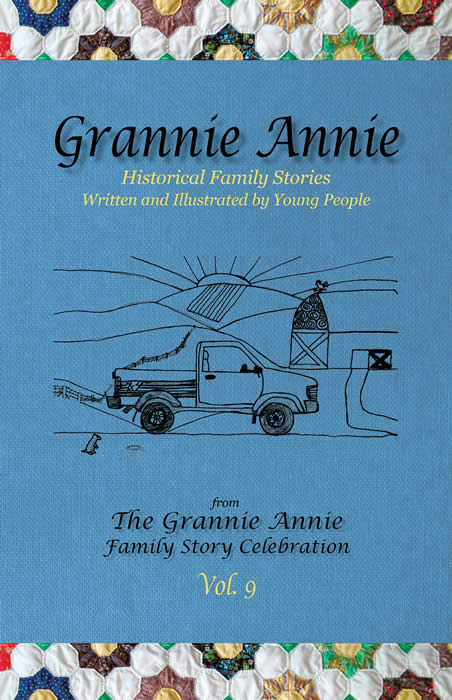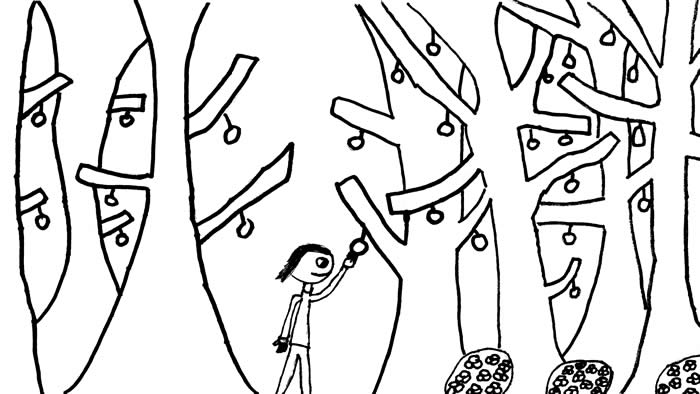Selected Stories from
The Grannie Annie Family Story Celebration 2013/2014
— Stories dated 1964–1976 —
1.
The Big Win!
Manhattan, New York, New York, USA; c. 1964
I ran my fingers through my crispy, reddish-brown hair as I walked up into the room. As nervous as I was, I answered the first question. I could not believe I was even standing where I was. But no matter how scared, nervous, and worried I felt, I continued answering questions. A huge relief washed down my spine once I finished the interview.
“Thank you,” said the man. “I will let you know if your interview will get you onto the show.”
Two hours later, I was sitting in the back row of The Price Is Right studio, clenching my husband’s hand. There were no words to describe how long I had wanted to be on the show and how excited I was just to be in the studio.
“Remember, all that matters is that you did y—”
“I know, Max!” I said, cutting him off.
I continued to hold his hand, and felt a little bad
because I was squeezing sooooo hard. He looked like he would explode.
“Our first contestant . . .” said the announcer. This was the moment I had been waiting for since I had sent for tickets months earlier.
“Sigma Levy! C’mon down!”
Everyone was cheering — for me! He had called my name — me! I ran down the steps as fast as a cheetah or a jaguar or even a rocket ship with blazing hot fire coming out! I think that was probably the fastest I had ever run. Maybe it was the joy running through my blood. Or the happiness in my bones. Or . . . I don’t know.
I sat down on the stage and waited, questions running through my head. What if? But . . . How come? Millions of thoughts raced through my mind. It’s okay! I reminded myself, trying to get rid of the nervous feeling as the cameras started. It sure did feel awesome to be on TV. Me — just a woman from a really small town in Arkansas — on The Price Is Right!
The beautiful girls showed us the first item. It was a bedroom set. I carefully made my guess for the price, and so did the other contestants.
Then Bill Cullen, the host, announced the price, and my guess was the closest! Wa-hoo! I had just won a bedroom set. Yay!
Then we waited as the next items were displayed for us to guess the prices. You bet I won those, too. I kept on winning and winning. I won for four days and got lots of different prizes — the bedroom set, a whole bunch of beautiful artificial flowers, a refrigerator. But the best was a trip to Oslo, Norway!
Every day I was on the show, I did my very best — like I always do. But even doing that, someone beat me.
On the day when I lost, my husband, Max, ran up the steps of the stage and gave me the biggest hug ever. It was so tight, I felt like I might explode! I felt so proud.
Leetal Cohn, great-granddaughter of Sigma; Missouri, USA
2.
Happily Ever Rafter
St. Louis, Missouri, USA; 1966
The year was 1966. My brother Eddie and I had been assigned the task of getting some mischievous birds out of our attic. Eventually we got them out, but things didn’t go exactly as planned.
“Ugh!” I cannot believe Dad is making us do this!
“Deb, come on. Dad needs us to do this. We can’t wimp out, or he’ll get agitated with us. Let’s go.”
“Fine. But I will always hate birds after this.” We pushed up the small slab of drywall and climbed into the attic. When Eddie got up, he spotted the birds’ nest about ten feet away. He stood up and wobbled.
“Deb, these rafters aren’t quite wide enough to walk on. We are going to have to scoot to the nest. Will you hand me the broom please?”
I handed him the broom reluctantly and started to climb up. I started to scoot behind Eddie, but he was going really slowly. “Eddie, please go faster. I want to get out of this disgusting attic!”
“Deb, have some patience, okay? We are almost there. If we go too fast, we will scare them.”
“Eddie, I know, but —“ I was interrupted by some footsteps down the hall. Eddie looked at me with fear in his eyes. In unison we whispered, “Dad.”
His head poked up into the attic. We both were anticipating a yell or a shout, but he just chuckled and shook his head. I was kind of embarrassed, because we were sitting on the rafters about five feet away from the nest after what had been probably half an hour, and we had done zero percent of what we needed to do.
“Man, you kids are big ol’ wimps. Just stand up and walk, and you’ll be done in a second.”
“Dad, we tried. The rafters aren’t sturdy.” Eddie looked at Dad fretfully as Dad started towards the nest. “You’re going to fall.”
 “I won’t fall. Now hand me that broom and — ” BAM! Dad’s left foot slipped off of the rafter, and he fell through the ceiling, right into his room! I looked at Eddie in horror as the birds jumped up, startled, and flew into the hole after Dad. “I won’t fall. Now hand me that broom and — ” BAM! Dad’s left foot slipped off of the rafter, and he fell through the ceiling, right into his room! I looked at Eddie in horror as the birds jumped up, startled, and flew into the hole after Dad.
Eddie snickered and said, “I told you so.”
I jumped down through the hole Dad had made and found him on the floor, shuddering. “Dad, are you okay?” I examined him to see if he had broken any bones. That had easily been a ten-foot fall!
“Yes, I’m okay. I’m just worried about what your mother will say when she sees this!” I nodded, also wondering what she would say.
“Let’s not worry about this right now. We need to get the birds out of the house before we have two problems to face.” Eddie leaped down through the hole, the broom in his hand, and ran down the hall towards the birds. Together we shooed the birds out the door. Like I said, things didn’t go as planned, but thank goodness we got the birds out.
Abigail Fink, niece of Eddie and Deb; Missouri, USA
Illustrator: Luke D. Tyler; Missouri, USA
3.
The Compound Wall
Kabisthalam, Tamil Nadu, India; 1968
The opportunity for adventure was too great, almost as if the conditions were set up. How could they not do it? Just one compound wall surrounding the theater’s interior — their only obstacle to having the time of their lives. So who cared that his brother’s wedding was the next day? It was just one movie they absolutely had to see — and only one wall in their way.
The plan was to sneak in and out, just like that. My grandpa, who would one day hardly take his eyes off of his grandchildren as they crossed the street, was a rebel. The wide-eyed boy who had collected spare change from odd jobs just to get into the cheapest theater seats had grown into the eighteen-year-old obsessive movie watcher who would do anything to catch the latest flick. His passion for movie watching and storytelling had been sparked when he was little; now the spark had grown into a raging fire. My grandpa lived on the edge, and life was his adrenaline rush.
Getting in was easy; with a boost from his cousin, my grandpa effortlessly scaled the mountainous compound wall surrounding the theater. And they had intricately worked out every detail of their escape to the second; there was no way this could go wrong. Well, let’s just say that the Titanic was supposed to be an unsinkable ship.
The movie itself was reportedly “fantastic” and would later be described as being worth the risk involved, but the climax of their escape came only after the credits rolled off the screen. As they were sneaking away from the theater, everything went horribly wrong.
The compound wall, once again, would be the only object impeding their escape. This time my grandpa’s cousin went first, just to keep things fair. My grandpa had no one to boost him up, so he began climbing the ten-foot wall on his own. What he hadn’t noticed were the haphazardly placed wooden boards and nails that stuck out from random spots on the wall. On the way up, he fell, tearing his flesh along every nail and splintery piece of wood as he plummeted downward.
Minutes later he staggered into the wedding hall, inexplicably looking like a hero injured in battle. There was an open wound stretching across his chest, and fresh crimson blood had seeped through to his shirt. Barely conscious, he collapsed as the rest of the family, who had already been setting up decorations, rushed to crowd around him — all panicking with quickened heartbeats, wondering whether or not the wedding that had been planned for months could still go on.
But this act was just one of several similar occurrences for my grandpa, so he was quick to toughen up in time for the wedding. In no time, he was back on his feet, surrounded by a group of newly acquired adoring fans as he recounted the story of his heroic stunt once again — with all of his usual dramatic flair.
Preethi Sriraman; Missouri, USA
4.
Into the Mountains
Jiangxi Province, China; 1968
“My legs are going to give in any second,” my aunt Yun said, breathing heavily.
“At least we didn’t get lost!” one of Yun’s friends said. Getting lost was the one thing Yun, the other students, and the rice farmers had worried about.
It was 1968, and many people in the city where Yun lived didn’t have enough food to eat. Since the farmers who grew rice needed help to plant more rice, many teenagers who lived in the city had moved to the countryside to help the farmers. Sent by the principal of their school, Yun and her classmates had ridden a train for fifteen hours and had walked five miles before reaching their destination. Finally they arrived in the big Yellow Mountains (that were not yellow at all), in Jiangxi Province, China, to plant and harvest rice.
On one particular hot summer day, some of the farmers took Yun and her friends on a walk. After what seemed like hours of walking, the students wondered where they were going and when they could sit down and rest their sore legs. “Where are the fruit trees you were talking about?” one of Yun’s classmates asked, clearly miserable from the heat.
 “The fruit trees and the water springs are just up ahead,” one of the farmers said, nodding his head and pointing his finger. “The fruit trees and the water springs are just up ahead,” one of the farmers said, nodding his head and pointing his finger.
Despite their sore legs and difficult breathing, the students ran across the dusty road toward the orchard. Once all of the students reached the trees containing fruit, they split up. Thinking she had never seen so many colors in her life, Yun picked a blueberry-shaped fruit. It tasted like a mix between an apple and a pear. She had never tasted or seen this strange fruit in the city.
Just as Yun got thirsty, she spotted a very small geyser. It looks like a magic water fountain that has been shooting up water since the beginning of time, she thought. Through cupped hands, she drank some of the water, and she gasped with delight. The water was not only cold, but it was also refreshing. She had never tasted anything like it in the city.
Once Yun’s thirst had been quenched and her hunger had been satisfied, Yun realized that staying in the mountains might not be so bad after all. She continued to plant and harvest rice for ten more years before returning to her home in the city and seeing her family again.
Hannah Gao; Missouri, USA
Illustrator: Cameron Roberts; Missouri, USA
5.
A Purple Mess
Camden, South Carolina, USA; 1974
What my dad thought was going to be the best day ever, turned to the worst day ever. My dad was in first grade, and a day soon to come was making him feel energized and excited.
My dad was a Cub Scout. He was at a den meeting where the leader announced that the boys would be having a project that would be displayed to all of the parents and the other scouts. The display would be at the school, and the boys would have a dinner to attend before the awards were given out. The boys would all be making wooden rockets, and they all got a plain block of wood to carve and paint.
My grandpa was out of town and he couldn’t help my dad, so my dad decided to make the rocket himself. He got out the wood, the paint, and a paintbrush, and headed down to the musty garage. He didn’t know how to carve wood, so he decided to skip that step.
He started painting blue at the top, white in the middle, and red at the bottom. He was going for a patriotic look, to win the “USA” award. After he glued the shiny capital letters “USA” onto the rocket, he was satisfied with himself and got up. As he was getting up, he knocked over the paint, and it splattered everywhere. His rocket, which had been red, white, and blue, was now a messy, wet, purple piece of soggy wood. He called his mom down to help him clean up his project, but it was no use.
The next day was the big award show. My dad tried to convince his mom not to go, but she said everything was going to be fine. My dad sure hoped so. When he got to school, there were rows and rows of tables with nicely painted and well-carved rockets displayed on them. My dad quickly put his purple mess on the table and walked away before anyone knew it was his.
After the dinner everyone came around, and the leader announced the winners. “And last, but not least, the award for ‘Do It Yourself’ goes to . . . Tracy McMillin!” My dad was shocked, but he did deserve the award, considering all the other boys’ dads had done the work for them. My nana gave my dad a look that said, I told you so. My dad proudly walked up to the man and got his award, and my nana was very happy for him.
Through this experience my dad learned to never give up and to always be confident, because you never know what will happen. I hope this story can teach you the things that it taught my dad and me.
Neeve McMillin; Missouri, USA
6.
The Walk Across Canada
Canada;1975
My great-grandpa — the Reverend William Paul Conrad Rabel, or “Will,” as many people called him — walked across Canada in 1975. He had always wanted to do it, and after his wife died, he decided it was time. He dedicated the walk to paying the mortgage for the Richmond Church of God, the church that he pastored in Richmond, British Columbia, and to raising money for the Canadian Cancer Society to help fight the disease that had killed his wife.
He began his walk at Halifax, Nova Scotia, on March 21. The entire walk was about 3,592 miles, or 5,780.764 kilometers, in length. He earned an average of ten cents per donor per mile.
Will took Sundays off during his walk in order to visit churches, where sometimes he was asked to preach. He met lots of people along the way. One of the people he met was a Canadian soldier who became one of his friends. The soldier took Will to an army camp to get a pair of army boots made for him. For the last 2,500 miles Will wore those boots — and had to have the boots resoled three times!
One day while Will was walking, a huge dog came running across a field toward him. Will prayed for protection. Just as the dog was about to attack, a semi truck ran the dog over.
Several of Will’s grandchildren joined him for short periods of time during his walk. When my mom was walking with him along the Trans-Canada Highway, a Mountie drove up to them and asked him why she was walking with him, because the Mountie thought Will was kidnapping her.
Will collected stuff he found along the way. He found two uncashed checks along the road. He wrote to the owners of these checks to return them. He picked up enough tools during his walk to fill a toolshed!
Will was fifty-nine years old during his walk. He finished his journey on September 21, exactly six months after he began the walk. Technically he went across Canada four times. First he drove to Halifax. Every morning he drove his car to his ending point for the day. Then he hitchhiked his way back to that day’s starting point and walked back to his car. It took him almost 10,000,000 footsteps to complete his journey.
Will said later that he might have had to ask for permission if he’d wanted to walk across Canada again, as he was getting married less than a month after he finished the walk. About eight years later, Will died of a massive heart attack while walking up to the pulpit to lead the prayer at camp meeting.
Sterling Ebel; Ohio, USA
7.
Tangshan Terror
Tianjin, China; 1976
My mother says she remembers the event like a silent film. It was a dark, stormy night in 1976. The wind howled at the windows as if trying to fly into the dimly lit apartment. In a room partitioned by a hanging sheet, my mother and aunt were sleeping softly. The day before, chickens in Tangshan were trying to fly out of their coops; dogs whimpered and paced. Every animal and insect knew the coming danger. Only we, the foolish governors of the earth, didn’t. Our ignorance would have many horrible consequences in the hours to come.
In the early hours of the morning, before the sun appeared but after the clock signaled the start of a new day, the earth struck. More accurately, it slipped. A fault line that had been building tension shot forward, creating a wave so powerful that the rock transmitted it like water in the ocean. Meanwhile, on the surface, precious china plates in Tangshan cabinets rattled a few times, but it was dismissed as caused by the wind. A few minutes later in Beijing, radios wobbled on nightstands. Then the first plates fell. The sharp, unmistakable noise of shattering ceramics kicked their owners’ minds into action.
My grandmother held her children tight, one in each arm, and raced down three flights of stairs with my grandfather following closely behind. If there were an observation station in space, one could see the lights going out in central Asia as a visual representation of the main shockwave. The pulse blew past the tree-covered mountains and river valleys. In four seconds the pulse would reach my mother’s location. My grandmother rounded the bend in the stairwell and turned onto the fourth-floor landing. Three seconds — she reached the third-floor landing. By then, neighbors had joined the mad dash to get out of the building. One second left, and people landed a few meters from the door.
The ground heaved up and then dipped down into the depression caused by the wave. Pillars collapsed and shattered when they hit the ground. Smashed oil lamps mushroomed into towers of orange-blue flame, and wooden banisters shot splinters in all directions, like an orchestra of catastrophes playing the famous 1812 Overture. Then, as suddenly as it had started, the main shock passed, leaving a trail of mangled buildings and blood and fire.
My mother, aunt, and grandmother waited under a pitched tent of sheets several layers thick to keep out the rain and keep in the warmth of delicate, shivering bodies. My grandfather took the risk of going back into the building in the presence of multiple aftershocks to salvage what he could. He brought back some food and more bedding, along with one of my mother’s highly valued possessions, a Rubik’s Cube. For her, it was a sign of hope. We still have the same Rubik’s Cube in our home and the original instructions in a folder.
Kenny Wang; New Jersey, USA
Read additional stories from the 2013/2014 celebration:
Sneak a peek at Grannie Annie, Vol. 9 |


 “I won’t fall. Now hand me that broom and — ” BAM! Dad’s left foot slipped off of the rafter, and he fell through the ceiling, right into his room! I looked at Eddie in horror as the birds jumped up, startled, and flew into the hole after Dad.
“I won’t fall. Now hand me that broom and — ” BAM! Dad’s left foot slipped off of the rafter, and he fell through the ceiling, right into his room! I looked at Eddie in horror as the birds jumped up, startled, and flew into the hole after Dad. “The fruit trees and the water springs are just up ahead,” one of the farmers said, nodding his head and pointing his finger.
“The fruit trees and the water springs are just up ahead,” one of the farmers said, nodding his head and pointing his finger.
